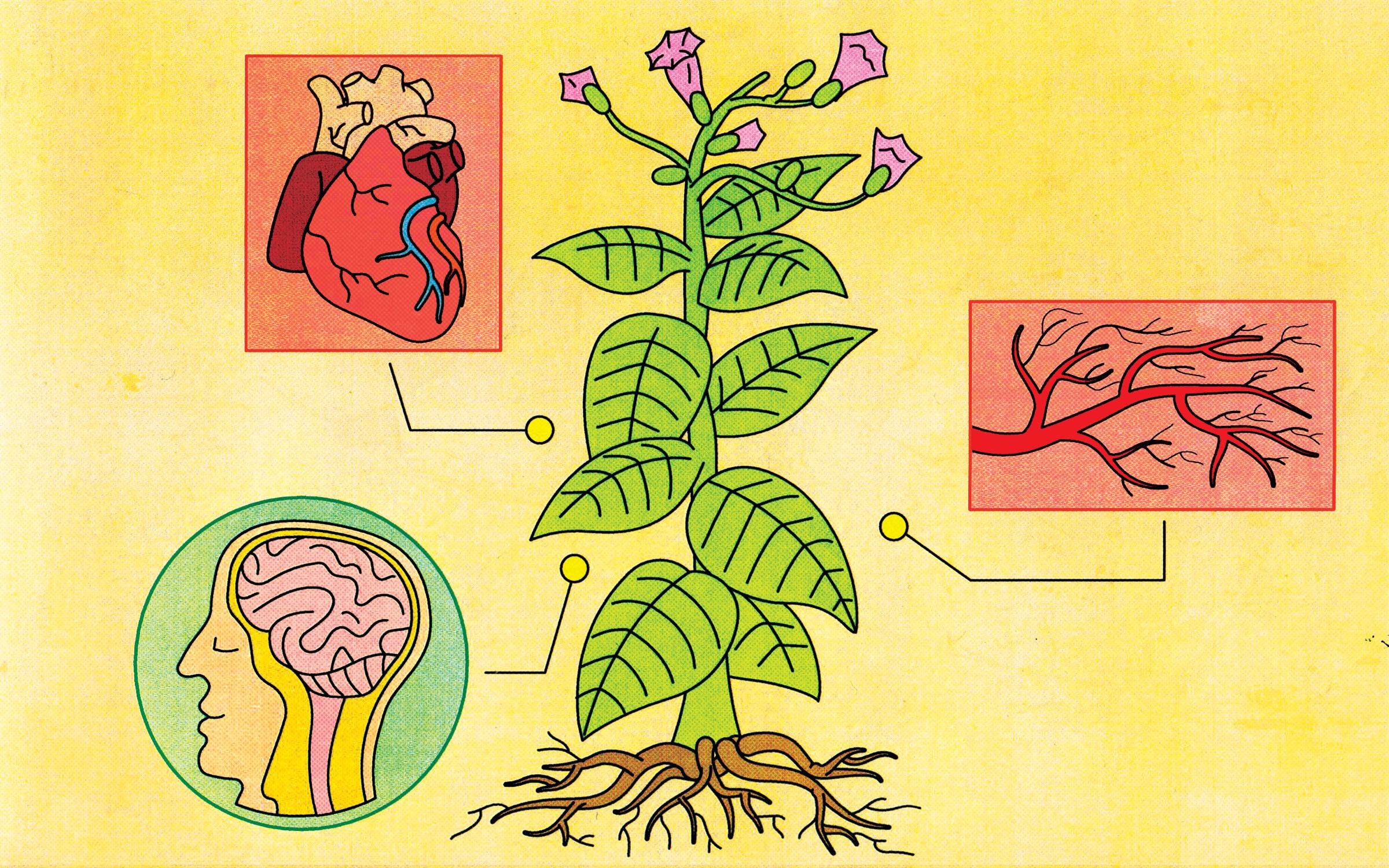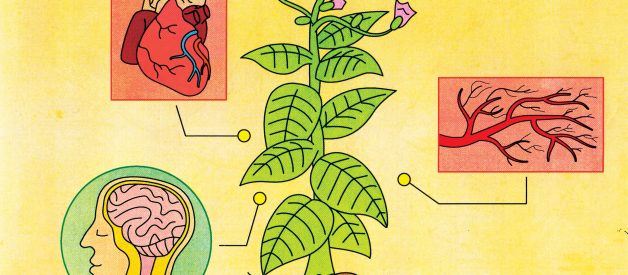The addictive drug can boost your cognition and won?t give you cancer, but that doesn?t mean it?s safe for casual use
 Illustration: George Wylesol
Illustration: George Wylesol
 Everyone is talking about the potential harms of vaping, and for good reason. One in four high schoolers report having used an e-cigarette in the past month, a 135% increase from just two years ago. Even more concerning, at least 42 people have died and thousands more have fallen ill from using faulty vape pens, although in most of those cases people were consuming THC.
Everyone is talking about the potential harms of vaping, and for good reason. One in four high schoolers report having used an e-cigarette in the past month, a 135% increase from just two years ago. Even more concerning, at least 42 people have died and thousands more have fallen ill from using faulty vape pens, although in most of those cases people were consuming THC.
With such a focus on the physical concerns around vaping, the main psychoactive ingredient in e-cigarettes, nicotine, is often left out of the conversation. The chemical additives in tobacco cigarettes, and potentially e-cigarettes, too, are obviously bad for you. But what about nicotine itself? It?s mood-boosting and attention-sharpening effects are often cited as the reasons people use these products, so is ?pure nicotine? good for you? And is it possible to get the chemical?s benefits from another method (nicotine patches or gum) without any health ramifications? Probably not.
Nicotine is produced by tobacco plants, but it?s also found in trace amounts in vegetables in the nightshade family, like eggplant, cauliflower, potatoes, and tomatoes. The chemical acts as a natural insecticide because of its action as a neurotoxin. In the human brain, nicotine activates nicotinic receptors, but don?t let the name fool you. These receptors did not evolve for nicotine, they?re only named for the drug because that?s how scientists discovered them. The receptors are actually intended for the neurotransmitter acetylcholine, a chemical important for attention, memory, and cognitive processing. Nicotine mimics acetylcholine and fits into the neurotransmitter?s receptor like a key into a lock, resulting in many of the same effects as the natural chemical, but at a much higher rate.
When tobacco smoke or nicotine vapor is inhaled, the drug rushes into the brain and floods the receptors within 10 seconds, providing an almost instant buzz. There are nicotinic receptors in virtually every region and cell type in the brain, which is why nicotine has such diverse and wide-ranging effects. For example, there are receptors on dopamine neurons in an area of the brain called the nucleus accumbens, a major hub for addiction. When the nicotinic receptors there are activated, the neurons release dopamine, a neurochemical critical for feelings of reward.
?One thing that all addictive drugs seem to have in common is that they do, in some way or another, enhance a dopamine signal in their initial use,? says John Dani, chair of the Department of Neurosciences at the University of Pennsylvania. ?Part of what [that signal] does is say, ?Reinforce whatever behavior is going on right now. I want you to learn this and to repeat these kinds of behaviors.??
Elsewhere, nicotine stimulates the release of GABA and serotonin, neurochemicals that can provide a mood-boosting, anxiety-relieving effect. (These neurochemicals are also modified by anti-anxiety and antidepressant drugs in the hopes of treating those conditions). In other parts of the brain such as the hippocampus, the memory center, and the prefrontal cortex, the executive control center, nicotine increases levels of the neurotransmitters glutamate and acetylcholine itself ? chemicals that play a role in learning, memory, and concentration.
?It is a drug, it does have effects on the body, but it?s not the reason that people die from smoking.?
Nicotine also impacts other organs in the body, particularly the heart and cardiovascular system. The drug increases blood pressure and heart rate, constricts blood vessels, and over the long term it can contribute to the hardening of artery walls. The chemical also promotes the formation of new blood vessels, which has been linked to tumor growth by bringing nutrients and oxygen to the cancerous cells. Nicotine does not cause the tumor by itself, but if someone has cancer, nicotine will aid the growth and metastasis of the tumors.
?It is a drug, it does have effects on the body, but it?s not the reason that people die from smoking,? says Judith Prochaska, an associate professor of medicine at Stanford University. ?It doesn?t seem to be deadly in terms of cancer or heart disease, but it will speed up your heart rate; it can create tachycardia in some people.?
Nicotine?s cognitive effects have gained significant attention in recent decades, and some non-smokers have even started using nicotine gum or patches as a nootropic. Research has shown that nicotine can speed up reaction time, improve working memory, and enhance focus and attention. A major confounding factor in these studies, though, is whether the people who are tested are smokers or non-smokers. Scientists know that someone whose brain has adapted to having nicotine onboard all the time does better after being dosed with the drug, especially to offset symptoms of withdrawal. Whether the chemical has the same effect on someone who is nicotine nave is less clear, with some studies showing a benefit while others do not.
?If you?re functioning well, then there?s not much evidence that nicotine will enhance that,? says Paul Newhouse, a professor of psychiatry, pharmacology, and medicine at Vanderbilt University. ?In fact, if you simply flog nicotinic receptors in normal performing individuals, you will actually make performance worse.?
Newhouse thinks nicotine could, however, help people who are cognitively impaired. The drug has been tested in clinical trials to treat Alzheimer?s disease, ADHD, and the cognitive problems that can accompany schizophrenia and depression. Alzheimer?s could be an especially good disease to target because patients have less acetylcholine activity and fewer nicotinic receptors in their brains. A small, steady dose of nicotine ? roughly the amount of a standard cigarette ? delivered over the course of the day might be one way to offset those changes and treat some of the cognitive symptoms of Alzheimer?s.
In an initial study of 74 people with mild cognitive impairment, a precursor to Alzheimer?s disease, those who received nicotine performed better on cognitive tests than those who did not get the drug. What?s more, some of those people even improved on a few of the tasks over the course of six months, suggesting nicotine could potentially prevent cognitive decline in Alzheimer?s. Newhouse is now conducting a larger, multi-site trial to try to confirm these findings and understand what?s happening in the brain during treatment.
Historically, late-stage clinical trials attempting to use variants of nicotine have not been successful. While initial small studies often show promise, all of the larger clinical trials testing either nicotine itself or analogs of the drug have failed to show a benefit above placebo.
One potential reason nicotine has largely failed as a therapeutic drug and isn?t recommended as a nootropic is its short half-life ? how quickly it?s cleared from the body. The drug?s effects start to wear off within an hour or two, and a couple hours later withdrawal sets in. At that point, not only are acetylcholine and dopamine receptors empty, the body?s stress response kicks in, too.
?While it may sound great to have a good mood and [be] less anxious and more relaxed and able to concentrate better, the drug doesn?t last very long,? Prochaska says. ?Then it puts you into a state of withdrawal… where you feel irritable and agitated, poor mood, anxious, can?t concentrate, hunger, difficulty sleeping.?
The other major issue is tolerance. Smoking causes nicotinic receptors to become desensitized and unresponsive to the drug in order to protect the brain from receiving too much of it. At the same time, an upregulation of nicotinic receptors in the brain occurs, meaning more of the receptors are produced to keep up with the influx of the chemical. Taken together, upregulation (more receptors) and desensitization (less sensitive receptors) seem counterintuitive, and scientists aren?t exactly sure why both occur. But the ultimate goal is to help the brain adapt to what it considers its new normal ? being flooded with nicotine.
?Tolerance to the effect of nicotine develops after repeated exposure to the drug,? says Imad Damaj, a professor in the Department of Pharmacology and Toxicology at Virginia Commonwealth University. ?Nicotinic receptors, when activated, they go into what we call a desensitization state, they desensitize. It?s a phenomenon present in many [types of receptors] to protect the organism from overstimulation, because if you continuously activate any receptor you?re going to over-activate it, and you?re going to harm the tissue or the organ.?
So, if you are addicted to nicotine, what can you do to quit?
It is extremely difficult to stop smoking cold turkey without any replacement options. Unaided, success rates at quitting smoking hover around 3% to 5%. One reason it?s so difficult is because smoking is built into many people?s everyday routines, resulting in constant triggers.
When nicotine causes a surge of dopamine in the brain, the neurochemical not only signals that something rewarding is happening, it also tells the brain to learn how to repeat that action again and again and again. In this way, dopamine cements the connection between an action and an outcome, as well as the cues surrounding it. Those cues ? whether they?re a person, place, time of day, object, or event ? then become triggers for craving, and for many people, those cues are everywhere.
?All the times that people talk about when they smoke their cigarette [are] deeply embedded in the day,? says Dani. ?You can?t avoid the alarm going off. You can?t avoid breakfast in the morning. You can?t avoid driving home from work. It?s hard to avoid your friends and avoid your own parking lot. All those things become cues that encourage the smoking of a cigarette.?
One way to address those cravings is with nicotine replacement therapy, such as the patch or gum. These devices substitute the nicotine in a cigarette to stem people?s withdrawal or cravings, but they deliver the drug at a lower and slower dose, so people don?t get the same rush they feel from a hit off a cigarette or vape pen.
?I tell people, if you?re smoking, use nicotine replacement therapy patches and gum,? says Damaj. ?Don?t hesitate, because the damage and the harm done by cigarettes is just huge and tremendous.?
Another option that?s emerged in recent years is Chantix, the first prescription drug specifically aimed at treating nicotine addiction. Chantix is a so-called selective partial agonist, meaning it only half activates some of the nicotinic receptors in the brain. The ones it does act on are those in the nucleus accumbens that most contribute to addiction. The idea is that by partially occupying the receptors there, Chantix reduces feelings of craving and withdrawal but without producing a pleasurable buzz.
Also, if a person smokes while they?re on Chantix, it crucially blocks nicotine from activating the receptor because the prescription drug is already sitting there. In this way, Chantix is able to help people quit smoking by both minimizing craving and withdrawal, and making smoking less pleasurable. Year-long abstinence rates using Chantix range from 19% to 27%.
Another strike against nicotine is that the drug is lethal ? ingesting high doses (from 50 milligrams to 0.5 grams) of the chemical can actually kill you.
Nicotine poisoning is not how cigarettes contribute to smokers? demise, and it?s not behind the recent rash of deaths attributed to vaping, which are thought to be due to the additive vitamin E acetate entering the lungs. But it does mean people need to be careful when handling nicotine pods or e-liquid, especially if there are small children around who might try to eat or drink the product. An estimated eight out of every 100,000 children are poisoned by nicotine every year, and at least one child has died from drinking e-liquid.
?You know how someone who knows about the ocean doesn?t like swimming in the ocean because it?s scary?? says Dani. ?I feel the same way about nicotine.?


